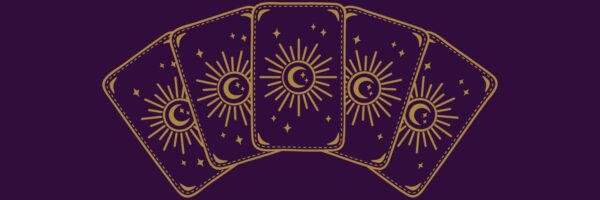 Getting an accurate and useful reading with Lenormand is more often than not about making sure you get the question right.
Getting an accurate and useful reading with Lenormand is more often than not about making sure you get the question right.
As you’ll see from my previous experiment with keeping a three-card-a-day journal for a week, the overall message really is that you’ll get out the quality that you put in.
You’ll find that often if you ask a vague question (or don’t ask one at all) you’ll get a vague answer, or one that is just as vague when it comes to interpretation (And yes, the old adage is actually “ask a stupid question and you’ll get a stupid answer” but I’m sure you get the picture!)
Why? Because the cards are often a reflection of what’s going on inside your head and how clearly you can articulate the problem or issue at hand. “So within, as without,” as they say. The clearer you are about what you’re trying to find out, while at the same time being open to the true answers, the more likely it is that you will find what you seek.
The Basic Rules for Questions:
- Be specific
- Be direct
- Be clear
- Be prepared for and open to unexpected (or unwanted!) answers
- Try to use open questions rather than yes or no for more information
- Don’t keep asking the same question just because you don’t like the answer!
- Be ethical and think about why you’re asking the question
What Are Open Questions And Why Are They More Useful In Readings?
Open questions are the opposite to ‘yes/no’ questions, where the answer will be either yes or no.
Yes/no questions can work but aren’t always that helpful for Lenormand readings because they allow for less nuance and influence, and the useful bits of information that the storytelling nature of Lenormand can bring.
Sure, you can get a feel for whether the overall answer is likely to be ‘yes’ or ‘no’ from the spread of the cards (for example, see my career reading examples here) but what is more interesting and informative about the reading in most cases is the reasons why or why not something is likely to go one way or another, the factors that are at play. It is these that form the deeper understanding of the issues that are at hand.
Open questions usually begin with one of the following:
How – ?
What – ?
Why – ?
Who – ?
Where – ?
When -?
For me, personally, I usually find the first three – How, What and Why ( unless I’m specifically trying to find out the details or identity of a person) yield the best results.
Examples Of Good Questions To Ask
You should be as specific as you can with the details of your particular question, using names etc as appropriate, but here are some broad examples:
- How is this visit likely to go? (not “Will the visit be awful?”)
- How can I best succeed in this endeavour? (not “Will I succeed in this endeavour?”)
- How can this problem resolve?
- How did this issue arise?
- What do I need to be aware of this week?
- What blessings or positives are coming up for me this week?
- What is going on with this person and me?
- What is the key to this issue?
- What do I need to consider if I – ?
- Why is this person behaving the way they are?
- Why did I not get that job?
- Why have I not yet met my soulmate?
- Why has this couple broken up?
- Why has she not heard from this person?
As you can see, it’s helpful to use specific questions even if you are doing general readings
Questions and Ethics
This ties in with why you are asking what you’re asking, and knowing and thinking about the sort of answers you might get and the issues you are dealing with. It’s particularly important when you are reading for and about other people. When framing questions, I would always think about whether the answer’s going to yield something helpful or respectful or ultimately empowering for them or others involved.
So “How can I make this person love me/What do I have to do to make this person love me?” for example, is neither empowering or ethical. The idea of “making” anyone do anything goes against the principle of free will, and the kind of desperation revealed in the question is likely to be at the root of what the real issue is. “How can I find love/where am I likely to find love/Why haven’t I yet met someone?/What are the issues between me and x?” is likely to uncover much more helpful and ultimately empowering information.
Likewise, I’d never ask direct questions about health or health outcomes (even though sometimes issues can pop up in readings); these are questions for qualified health practitioners, not card readers. Responsibility for someone’s entire wellbeing or life path should ever be put in a reader’s hands; ultimately the responsibility should always rest with the person themselves.
Not Asking The Same Question Over and Over
A lot of readers give almost mystical reasons for why you shouldn’t keep asking the cards the same questions on the same topic again and again. As if the card are some sort of god or spiritual force who will punish you if you don’t “follow the rules” or bow down to them sufficiently.
Now, you may or may not have your own beliefs about the reasons why cartomancy works and the mechanisms and forces behind that, but for me I think the truth is much more grounded and simple. This is about you or the person you’re reading for, and the answers and issues you – or they – are happy or not happy to accept as possible. Often in life, the things you are least happy to have to confront are the things you find that you most need to.
I have often found that reading the cards and getting an answer I didn’t really like or wasn’t hoping for forced me to consider possibilities, situations or pathways that I wouldn’t have come across otherwise. And more often than not, the issues the cards turned up turned out in the long run to be absolutely correct, even if I didn’t quite feel ready to face them at that time. It’s almost as if the readings were simply reflecting what I knew subconsciously but didn’t really want to yet acknowledge. The cards, I have found, are very good at giving warnings, although perhaps that’s just me.
If you don’t get the answer you want and keep asking over and over until you do, you diminish the effectiveness of this aspect of Lenormand as a tool. I do understand the instinct, but if you’re just confirming what you already want to hear, you’re not necessarily doing yourself any favours, or getting the most from the cards.
Ask it once, and be done with it. In the long run, you’ll most likely be glad that you did!
Check out the Readings page for some examples of questions being asked in particular situations.
Or take a look at my Card Layouts page for step-by-step instructions on the key Lenormand layouts

thank u!!!!